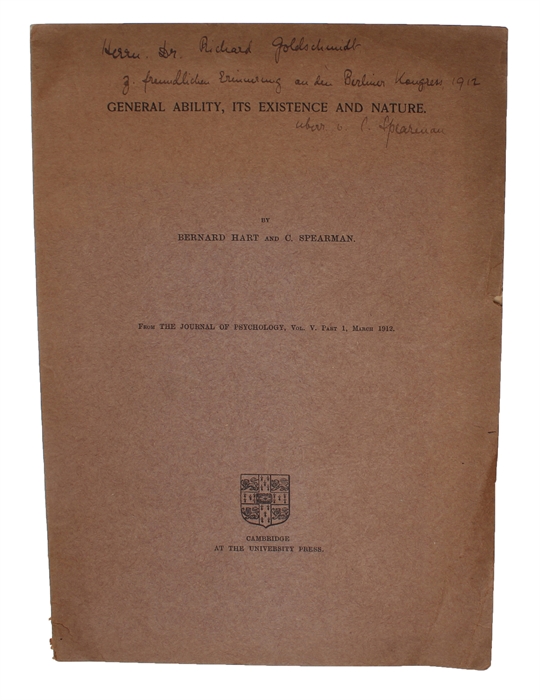PIONEERING FACTOR ANALYSIS - PRESENTATION-COPY
HART, BERNARD & C. SPEARMAN.
General Ability, its Existence and Nature. (Original off-print) From The Journal pf Psychology, Vol. V. Part 1, March 1912.
Cambridge, (1912).
8vo. Original printed wrappers. A bit of wear to extremities. A few nicks and creases. Inscribed to front free end-paper and with a few ownership-stamps (of the presentee- Dr. Richard Goldschmidt). (2) pp., pp. (51) - 79.
Original off-print of Spearman and Hart's groundbreaking paper on general ability, which created a conceptual framework for factor analysis and played an enormous role in IQ-testing, with an original handwritten and signed presentation-inscription from Spearman to Richard Goldschmidt (fellow psychologist and director of the Institute for Experimental Psychology at the University of Münster), expressing friendly remembrance of the Berlin congress 1912. "Spearman, with a collaborator, Hart, pioneered the use of the pattern of correlations between a set of measures to determine the number of abilities (Hart & Spearman, 1912). The tetrad difference criterion could test if a single common factor (g, or general ability, presumably) could account for individual differences on the measures. If the tetrad differences were zero, then a single common factor was supported, but if not, then it was unclear how many common factors were needed." (Susan E. Embretson: The Second Century of Ability Testing: Some Predictions and Speculations, 2001, p. 11) Charles Edward Spearman (1863 - 1945) was a famous English psychologist known both for his work in statistics, but primarily for his work on human intelligence. He was a pioneer of factor analysis, he gave name to the Spearman's rank correlation coefficient and did seminal work on models for human intelligence, including his theory that disparate cognitive test scores reflect a single General intelligence factor, and he famously coined the term "g- factor". "Charles E. Spearman, in full Charles Edward Spearman, (born September 10, 1863, London, England-died September 17, 1945, London), British psychologist who theorized that a general factor of intelligence, g, is present in varying degrees in different human abilities. The present paper is of the utmost importance, as it is here that Spearman, in collaboration with Hart, develops a conceptual framework for factor analysis, pioneering the use of the pattern of correlations in order to determine the number of abilities, one of the fundamental principles for psychometric methods.
The g-factor, also known as General intelligence, refers to the existence of a broad mental capacity that influences performance on cognitive ability measures. Terms such as intelligence, IQ, general cognitive ability, and general mental ability are today used interchangeably to mean the same thing as general intelligence or g-factor.
While serving as an officer in the British army (1883-97), Spearman came to believe that any significant advance in philosophy would come about mainly through psychology. Over the next 10 years he worked intermittently with Wilhelm Wundt, the founder of experimental psychology, at the University of Leipzig, and he took his Ph.D. there. He joined the faculty of University College, London (1907), and was professor there from 1911 to 1931.
Spearman's attempt to establish general, fundamental laws of psychology was based on his statistical work in determining correlations among mental abilities, reflected in his classic paper, " 'General Intelligence,' Objectively Determined and Measured" (1904). He sought to interpret correlations among several variables on the basis of a specific factor for each variable and a factor common to all. Because measures of seemingly different mental abilities consistently indicate correlations, he concluded that the prevalence of positive correlations must result from the general factor, g. By 1912 he and a coworker had developed an order of correlation coefficients separating various performances into the general factor, g, and varying specific factors, s1, s2, and so on." (Encycl. Britt.).
Order-nr.: 59959

